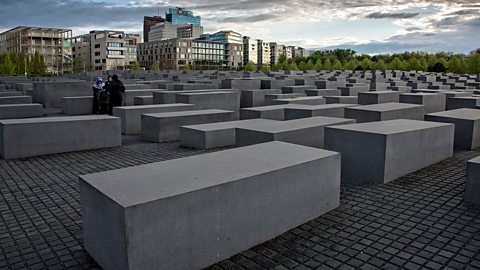What do you think?

The first historians of the Holocaust, such as Raul Hilberg (1961), studied the development of the Holocaust and its leaders and administration.
Hannah Arendt (1963) blamed the Jewish leaders for not resisting the Nazis.
By the 1960s, historians were arguing about why the Holocaust happened. The intentionalistsHistorians who believe that history is shaped by individuals and their actions. claimed that Hitler always intended to mass-murder the Jewish people. The functionalistFunctionalist (or Structuralist) historians believe that history is shaped by a combination of events. argued that that the Holocaust arose out of the chaos of the war.
Daniel Goldhagen (1996) suggested that anti-semitismHostility or prejudice against Jews. had turned ordinary Germans into 'Hitler's willing executioners'.
The Holocaust deniers
In the 1970s, holocaust denial started to hit the headlines after Arthur Butz (1976), an electronics engineer, published a book claiming that the Holocaust was a hoax. The thousands of Jewish people who witnessed the Holocaust, said the holocaust deniers, had all lied. Holocaust denial is against the law in 16 European countries.
Recent Holocaust debates
Nowadays respectable historians debate many aspects of the Holocaust: What caused it? What role did other people play, including the Soviets, Poles, Lithuanians and Hungarians? Did it gradually evolve over many years, or was the Final Solution a change of policy?
Martin Gilbert (1985) has described the many human ways in which Jewish people reacted to the Holocaust and has proved that they did not, as Hannah Arendt claimed, simply allow themselves to be massacred.
Question
How was Jewish persecution allowed to happen?
It is hard to imagine something like this happening today in Great Britain. If one group of people were persecuted the way the Jews were in Germany, it is likely that most people would get together and do something about it.
However, lots of people in Germany at the time were very poor and had had years of problems with previous governments. Hitler offered them a fresh approach and told them that their luck would improve if they got rid of the Jewish problem. Many Germans themselves disliked Jews because they did not understand why ‘foreign’ people should make more money than them.
When it came to the Holocaust, many Germans did not know about it until it was too late. Those who did know, were too scared to say or do anything. Hitler had made them feel as though they were always being watched by the secret police forces and they knew that the punishment for helping a Jew escape would be death.
Is this an excuse? Does this justify people sitting back and letting the Jews be treated in this way?
Historians fiercely debate this question of whether or not ordinary German people should take some responsibility for the Holocaust.
Where next?
It is difficult to study the Holocaust historically – it is easier to study it as a moral issue, which must never happen again. However, even to do that, we have to understand why it happened.
You may wish to compare the Holocaust to other genocideThe attempt to kill or destroy national, ethnical, racial or religious groups. throughout history. Examples of genocides include a famine in the Ukraine caused purposely by the Soviet leader Joseph Stalin to kill off the people there who wanted independence from Soviet Russia, Pol Pot and the Khmer Rouge in Cambodia, and the genocide against the Tutsi by the Hutu people in Rwanda.